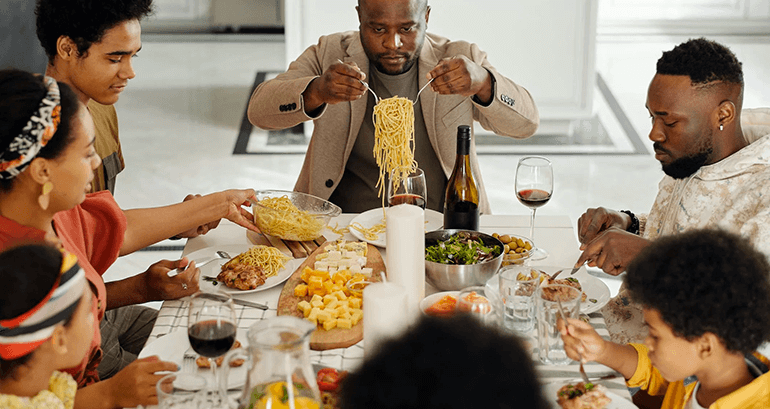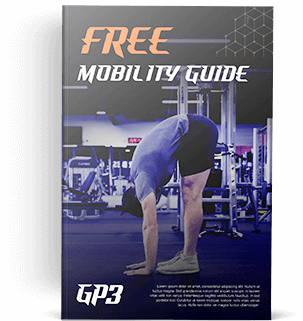Key Points:
1. The “always something” mindset is far superior for sustainable results than the “all or nothing” tendencies we typically display.
2. The holidays provide the perfect opportunity to practice “always something.”
3. These practices can lead to happier and less guilt-ridden celebrations.
Estimated reading time: 5-10 minutes
It’s that magical time of year again. When work deadlines, competing family obligations, and pressure to buy gifts all coalesce nicely around an overabundance of cookies, eggnog, and peppermint bark. It’s easy to give in and think, “Screw it, January 1st is a fresh start,” right?
Well, one of the first posts I wrote for this blog was about the “always something” mindset. This approach is generally superior to the far more common “all or nothing” mindset with which we often approach training and nutrition-dependent goals. If you’d like a refresher on the differences between the “always something” and the “all or nothing” mindsets, you can to check out the original article on my website.
Anyway, I decided to revisit this topic now, because the holidays provide ample opportunity to put “always something” into practical use.
First, debunking a common myth
You may have heard that the average person can expect to gain nearly five pounds between Thanksgiving dinner and New Years’ Day brunch. Good news! That’s not actually true. The average weight gain is closer to one pound.
Now, trouble can still arise because many people tend not to lose this extra pound the next year. Following this trend, one could conceivably progress from a perfectly healthy weight in their teen years to morbidly obese by retirement age.
Obviously, life doesn’t often adhere to such a linear path. This outcome is not particularly likely, so we shouldn’t be scared of it. We should simply arm ourselves with knowledge so that we have the power to take matters into our own hands.
Don’t take the easy way out
Before we talk about how to do that, here’s a bit of tough love. “All or nothing” is easy. Drawing hard lines in the sand and saying, “I’m not going to have ANY Christmas cookies or eggnog,” is just as extreme as saying, “Eff it,” and eating everything in sight. The former strategy also tends to backfire. Maybe it works for one Christmas party, or one day, or even a whole week. But…
This level of restriction can just as easily lead to a late night solo binge-session. Then come feelings of shame and a desire to punish oneself with restrictions that perpetuate the whole vicious cycle. Balance comes from finding a way to enjoy certain treats and indulgences consciously.
Let’s talk about “Food FOMO”
Many of us likely already know the acronym “FOMO,” or “Fear Of Missing Out.” This concept typically refers to not being able to participate in a fun event or being stuck at work while everyone else somehow snagged tickets to the oh-so-important Taylor Swift concert. But, we often overlook FOMO’s influence on eating.
I used to say that I was quite good at not buying sweet treats for myself but if I was put in a situation where they were readily available, all bets were off. At a party or work event, I’d sample pretty much everything I could get my hands on, particularly desserts. Or, if I found myself in a situation where lunch was catered, “Yes please, I’ll have the brownie, chips, and one apiece of the four different types of cookies, thank you very much.” Maybe you can relate. And there is a reason some of us are like this.
According to Dr. Stephan Guyenet’s excellent book, The Hungry Brain: Outsmarting the Instincts That Make Us Overeat, we’re evolutionarily wired to overconsume. Finding a large source of calories in a relatively small package, like a particularly fatty piece of buffalo meat or an abandoned hive of honey triggers our brain’s deeply-rooted survival mechanisms. It says, “These calories will help you make it through the long, barren winter. They massively increase your chances of passing on your genes…eat until you can’t move!”
Consuming food with certain flavor profiles (typically the combinations of salt or sugar paired with fat) overrides the signals from our brain associated with fullness and satiety. So, we do eat until we’re beyond stuffed. A free source of calories magnifies this effect even further. Just look how quickly donuts or pizza disappear if someone brings them into the office. Our lizard brains feel like free calorie-dense food is simply too good a deal to miss out on on.
Like Always, Awareness is Key
Food FOMO doesn’t make much logical sense. Perhaps with regular FOMO, it’s easy to imagine that an event we missed may truly never come along again. But with food, how often is there going to be a dish or treat that we couldn’t buy or make for ourselves in the future? Almost never. Now, logic vs. millions of years of evolution isn’t a remotely fair fight, but we can tip the scales in our favor by catching ourselves in the midst of thought patterns that say, “You have to grab two more of those brownies! Otherwise they’ll be gone forever!”
Unconscious tendencies have a great deal more power to shape our behavior when they remain unconscious. So, being aware of this hardwired biological tendency can help equip us for success at upcoming holiday celebrations.
But what does “success” actually look like?
Hopefully you know me well enough by now to guess that it’s not eating nothing but carrot sticks and water at every holiday get-together. That’s the opposite of what we should be aiming for. Instead, we’re going to focus on consciously choosing what we’d like to enjoy. So, how the heck do we do that?
Your Three-Step Party Strategy
Here are a few of the “somethings” we can do, rather than toggling between the “all or nothing” on-off switches.
1. Remember discomfort
Before any of the opportunities you’re about to face in which you could easily consume an entire day’s worth of calories in one sitting, try to recall a time when you did exactly that. There’s one important caveat, however. This is not, I repeat, NOT about guilt. This is about remembering the physical sensations only. If you focus hard enough, you can actually feel a less intense version of the physical aspects of nearly any memory. So in this case, try to recreate the feelings of bloating, pressure, and lethargy that accompany being “stuffed.”
Because let’s be honest. We’ve all experienced that feeling, and it sucks. A lot. Reminding ourselves of these sensations ahead of time can help motivate us to avoid them in the future.
2. Plan ahead by picking a number
Overindulgences tend to become easier in the presence of alcoholic beverages, sweet treats, and salty snacks. Rarely will you see someone eat to the point of passing out because they chowed down on nothing but three pounds of Christmas ham.
So, there are a couple of tactics we can use here.
First, pick a number. You could decide that between drinks, sweet treats, and savory sides, you’re going to have five total servings. For example, you might enjoy two glasses of eggnog, two helpings of mashed potatoes, and a brownie. Other than that, it’s entrees only. The number you choose doesn’t matter nearly as much as your decision to consciously pick one.
Second, here’s one of my favorite planning options. If I know I’m going to an event where it’s likely that I’ll be eating a ****load (to use the scientific term), I’ll make sure the day’s other meals reflect that. To clarify, for breakfast and lunch, I’ll try to only eat foods that are lower in calories, higher in water volume, and more satiating. Think raw fruits and veggies, lean protein, and eggs. I’ll also drink lots of water and eat slightly smaller portions than normal.
However, this can be taken too far. I don’t believe it’s a good idea to fast all day prior to an event like a Christmas party. When you’re faced with a delicious smorgasbord and you’re super hungry, forget about it. You’re going to eat until you can’t breathe. Pretending otherwise is a fantasy.
3. Use your surroundings to slow you down
The type of event that tends to have an abundance of treats also comes with a myriad of distractions. People to catch up with, games and activities, you name it. Instead of wolfing down everything on your plate, make a point to socialize, walk around, and participate in non-eating activities. Doing so between bites or servings will slow you down. This allows your body to process that it’s been fed, thus decreasing the likelihood of overeating.
Bonus Tip: plan the aftermath
Now, what if, despite all of this, you still go overboard? Good news. It’s not the end of the world. Any weight you gained overnight is 100% temporary. Actual weight loss or gain comes from consistently under- or over-eating.
With that in mind, let’s discuss an interesting but potentially unfortunate tendency common to our drive to eat. Our brains expect that what has happened will continue to happen, so this means that the day after overeating, your body still wants more. I’m sure I’m not the only one to experience the curious sensation of having overindulged at dinner and then finding myself “starving” the next morning. Physiologically, there’s no reason this should be the case, and yet it happens.
I’ve also found this principle to hold true when I’ve experimented with longer fasts. After a 24 to 36-hour fast, I typically don’t wake up hungry despite my body genuinely needing nourishment.
Knowing this provides some welcome autonomy. Therefore, unless you have a history of disordered eating, there’s absolutely nothing dangerous about delaying your first meal the day after an indulgence. Waiting until 12, 2, or 6 p.m. is perfectly fine, even beneficial. Your body will have plenty of stored calories for fuel. You could even utilize some of them to get a great workout!
Guilt is the only side dish worth skipping every time
To wrap up, I want to stress as strongly as possible that none of these strategies are about punishing or shaming ourselves. There is zero benefit to be gained from doing so. If negative self talk or intrusive thoughts arise after indulging in a few Christmas cookies, remember that you don’t have to listen to them. They’re probably not true.
Instead, the above strategies can help us embrace our imperfections and enjoy life. Because no matter how much we try to control, life is messy, unpredictable, and ever-changing. This means it’s so rarely conducive to an “all or nothing,” approach that we shouldn’t bother trying to force it to be that way.
So, the answer is to embrace a mindset of “always something.” It’ll be tough at first, but so are most things worth doing. And the time to practice is now!
Happy holidays, everyone 🙂
Before you go, I’d love to hear from you. Have you tried any of these strategies before? Did they work? Which ones are you most likely to practice over the next two weeks? Reply to this email and let me know!

